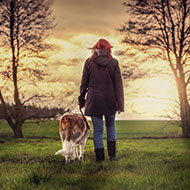
Fears locally-imposed orders will lead to unnecessary travel
The RSPCA is asking local authorities to relax restrictions on areas where dogs can be walked to help reduce transmission of COVID-19 and protect canine welfare.
Many local councils have introduced Public Space Protection Orders (PSPOs) to stop dogs being walked in areas such as sports pitches and beaches.
However, new government restrictions state that each person in a household may leave their home only once a day for exercise. This impacts dog walkers who are restricted on where they can walk their dog due to PSPOs.
The RSPCA is concerned that having limited areas to walk their pets will lead some dog walkers to feel that they have to travel to exercise their dogs and protect their welfare. The charity believes that temporarily relaxing PSPOs will stop unnecessary travel and allow dog walkers to continue exercising within their immediate communities.
The RSPCA has also issued advice to dog walkers, encouraging them to keep two metres away from others, keep dogs on leads and avoid contact with other people’s pets during the COVID-19 pandemic.
Dr Samantha Gaines, head of the RSPCA's companion animals department, said: "The RSPCA is concerned that if some dog owners do not have adequate space to exercise their dogs near their homes because of these local authority orders, they may make unnecessary journeys - contrary to the UK and Welsh Government's advice to curb the spread of COVID-19.
“It won't be possible, appropriate or safe to relax PSPOs in all areas. However, where it is possible and safe to do so, we're urging local authorities to be flexible and consider relaxing enforcement of PSPOs on dog walking - to help keep people as close to home as possible to help tackle COVID-19; ensuring more people have adequate dog walking spots as near to their home as possible.”



 The veterinary mental health charity Vetlife is inviting the veterinary community to join it for a sponsored cold-water dip.
The veterinary mental health charity Vetlife is inviting the veterinary community to join it for a sponsored cold-water dip.